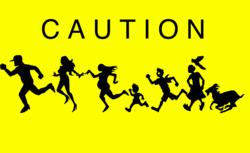Last week, the Latino Rebels were presented with the opportunity to write about a new web series called "The Guzman Show," which is the story about a stereotypical Mexican family that includes a cholo baby, pregnant teen and a goat, described as “a Latin-American Family Guy drenched in Tapatío hot sauce and created by a group of very sick and twisted minds.”


The Guzman Show will premiere online in April.
Sounds appealing, doesn't it? As hard as we are to satisfy with just a website, trailer and press release, we asked a few more questions about something so played out.
"There are Latino characters in most shows, but there was nothing specifically for us and showcasing a full Latino cast of characters," said Erica Menjivar, executive producer for the cartoon, via an email interview. She is the co-creator of the show, along with her sister Claudia.
You mean, there aren't enough stereotypical characters out in mainstream media for your taste? What have we been fighting all these years, then? I'm wondering where the drug-dealer Guzman cousin is at this point, because he didn't make his way into the trailer, surprisingly.
However stereotypical they want to be, Menjivar claims their effort is to get their audiences to laugh at themselves, their target audiences being Latinos. But, aren't there enough negative and stereotypical characters out there to learn from and see ourselves mirrored in over and over again?
"We do not identify ourselves with these stereotypes, we can laugh at them. It’s only a problem when we can’t laugh at it. But we're also being ironic, while shedding light on the fact that it is STILL happening and unfortunately growing," explained Menjivar. "With economic issues being what they are in this country, there is a lot of scapegoating going on. We're seeing a lot of hate being thrown at Latinos, Mexicans especially. But if we hate them back, then it becomes a never ending cycle of hate. So, instead, let’s transform that ugly into laughter."
So we're taking a hit and laughing at ourselves. But what if Latinos don't watch the webisodes which are set to begin April of this year? Mainstream USA has seen stereotypical shows like Mind of Mencia, who threw words like "wetback" and "beaner" back into the vocabulary mix, saying it was OK for everyone else to use it, when the Latino community was trying to combat it. I wondered, would this be the same thing? Menjivar says it's not educational programming even though she does compare it to Family Guy, which I think, takes a bit of intelligence to understand, no matter how sick and twisted it may be.
"It is meant to make you laugh. That is the purpose of it. But also, we are telling our stories as Latino people. The show will not be shallow. Often, it will force people to think about their stance on issues for Latinos and even non-Latinos," said the producer based out of San Francisco.
The story for this project came out of being stereotyped and degraded by hateful people. But in an odd way, Menjivar feels that this cartoon will bring people together; taking these stereotypes and publicly laughing at them, determining our own images, right?
"We are sure many Latinos have dealt with hateful people in this country, and perhaps they’ll find comfort because they are not alone," she said. "Hopefully they can laugh all the hate off. My mom always said, 'It is better to laugh than cry.'"
It made sense. Because you cannot determine or change the way people think or look at you, for that matter, the only thing you can determine is your own personal reaction. Therefore, making a cartoon of what Latinos can publicly laugh at curbs our anger, dismissing any sense of being controlled or labeled in a stereotypical manner.
Although the characters may be stereotypical and the risk of laughter walking a thin line, Menjivar says the story lines and insight into the episodes serve a fairly larger purpose.
"We are making fun of all stereotypes from all walks of life. We hope it makes people think more deeply about stereotypes," says Menjivar. "But we do plan to not be hateful for the sake of being hateful, but rather, to put a comedic light on the ridiculousness of bigotry."





joke site…
The Guzman Show: Your Stereotypical Family…